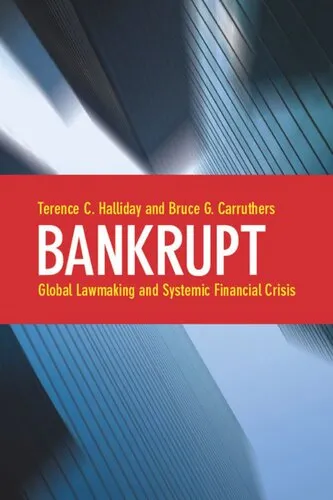Bankrupt: Global Lawmaking and Systemic Financial Crisis
4.0
Reviews from our users

You Can Ask your questions from this book's AI after Login
Each download or ask from book AI costs 2 points. To earn more free points, please visit the Points Guide Page and complete some valuable actions.Related Refrences:
Introduction to "Bankrupt: Global Lawmaking and Systemic Financial Crisis"
"Bankrupt: Global Lawmaking and Systemic Financial Crisis" by Terence C. Halliday and Bruce G. Carruthers is a groundbreaking exploration of the intricate intersection between international law, political power, and financial crises. Written with rigor and depth, this book offers a panoramic overview of how insolvency laws are shaped on a global level and their profound repercussions on economies and societies. It delves into the complexities of global financial governance, the dynamics of international lawmaking, and the far-reaching implications of systemic financial crises in both developed and developing nations.
As globalization expands, insolvency regimes and bankruptcy laws have transformed into critical tools for governance, particularly in times of economic instability. Through meticulous research, Halliday and Carruthers unravel the political and legal forces driving these transformations. Their analysis reveals how global institutions such as the International Monetary Fund (IMF), World Bank, and United Nations, along with policymakers and other key stakeholders, maneuver between cooperation and conflict in crafting bankruptcy laws that resonate across national borders. This book is indispensable for understanding the global efforts to stabilize economies while managing the inevitable tensions between state sovereignty and global governance.
In this introduction, we aim to provide a detailed summary of the book, key takeaways, notable quotes, and why this book remains an essential read for anyone interested in economics, politics, and law.
Detailed Summary of the Book
This book confronts one of the most pressing global challenges of the 21st century: the regulation of insolvency laws in the wake of systemic financial crises. The authors walk readers through the historical development of bankruptcy laws and how financial globalization has accelerated the need for harmonized legal frameworks. Halliday and Carruthers highlight the role of global institutions that standardize these frameworks, explaining how such standards are often forged through politically charged negotiations involving diverse stakeholders with competing interests.
A central theme of the book is the tension between developing and developed nations. While wealthy countries often push for stringent legal standards that align with their interests, developing countries negotiate for laws that can accommodate unique economic circumstances. The authors analyze how lobbying, institutional power dynamics, and ideological contests determine the final outcomes of global lawmaking. Case studies from global financial meltdowns, including the 2008 crisis, are used to illustrate these principles in action.
"Bankrupt" meticulously examines the ripple effects of systemic financial crises and the policy responses that follow. The book argues that global bankruptcy regimes not only regulate economic activity but also impact societal values, sovereign authority, and global justice. Ultimately, Halliday and Carruthers offer a thought-provoking narrative on how legal tools can either stabilize or further disrupt interconnected economies.
Key Takeaways
- Global insolvency law is both a technical and political process that reflects power dynamics between nations.
- Systemic financial crises reveal the weaknesses of domestic legal systems and spur demand for international legal standardization.
- The interplay of global institutions such as the IMF, World Bank, and United Nations demonstrates how multilateralism and sovereignty collide.
- Developing nations face significant challenges in aligning domestic needs with global legal norms, often sacrificing autonomy during financial crises.
- Bankruptcies are not just financial events—they carry profound social and political implications that resonate globally.
Famous Quotes from the Book
"The making of a bankruptcy law is not just a technical exercise in crafting a legal statute, but also a political act that enshrines the values and power of those who influence its creation."
"During systemic crises, bankruptcy law becomes the battleground where the global meets the local, and sovereignty either asserts itself or gives way to external pressures."
Why This Book Matters
In an era defined by economic interdependence, "Bankrupt" shines as a beacon of clarity on a subject that is both technical and deeply human. The global financial crises of the past decades have shown us that robust insolvency laws are not merely legal instruments—they are lifelines for economic recovery. Halliday and Carruthers demonstrate how these laws emerge from a complex web of negotiations, compromises, and power struggles, making this book essential reading for policymakers, legal practitioners, economists, and academics alike.
Beyond its scholarly contributions, this book speaks to anyone who seeks to understand the underlying mechanisms of globalization and their impact on everyday lives. It reminds us that the financial stability of nations is interconnected, and decisions made in one part of the world can ripple across the globe. If you want to grasp the intricacies of global lawmaking, appreciate the stakes involved in systemic financial crises, or explore the tensions between sovereignty and global governance, this book offers unparalleled insight.
Free Direct Download
You Can Download this book after Login
Accessing books through legal platforms and public libraries not only supports the rights of authors and publishers but also contributes to the sustainability of reading culture. Before downloading, please take a moment to consider these options.
Find this book on other platforms:
WorldCat helps you find books in libraries worldwide.
See ratings, reviews, and discussions on Goodreads.
Find and buy rare or used books on AbeBooks.
1415
بازدید4.0
امتیاز0
نظر98%
رضایتReviews:
4.0
Based on 0 users review
Questions & Answers
Ask questions about this book or help others by answering
No questions yet. Be the first to ask!














